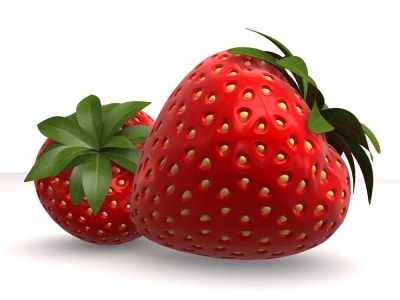
Watermelon is a good source of immune-boosting vitamins C and A. It’s rich in lycopene, a carotenoid noted for its protection against colorectal and prostate cancers. Watermelon is also brimming with arginine, which helps lower blood pressure. Choose watermelons that are firm, green and pale yellow near the bottom. Pre-cut fruit should have flesh that is deep pink-red in color. An excess of white streaks indicates an older melon. Peak season is May-August.
Blueberries are packed with anthocyanins, powerful plant compounds that keep blood vessels strong and ward off cataracts, night blindness, and macular degeneration. Blueberries also contain kaempferol, a phytochemical that may reduce the risk of ovarian cancer.
Blueberries should be smooth, firm and deep purple-blue in color. Only wash the berries right before serving and use within 6 days of purchase. Peak season is June-August.
Cantaloupe is one of the best fruit sources of beta-carotene, which protects against age-related eye diseases and boosts the immune system. Cantaloupe is also high in infection-fighting vitamin C, and a daily cup will help stimulate white blood cell activity.
Look for melons that are golden in color, aromatic and hollow-sounding when tapped. For the best flavor and health benefits, let the cantaloupe sit on the counter for several days until softened. Peak season is June-August.
Cherries help prevent gout by diminishing uric acid levels in the blood. Like blueberries, they are rich in beneficial anthocyanins. Cherries also contain vitamin C and melatonin, an antioxidant that helps fight insomnia and seasonal affective disorder (SAD).
Red varieties are best when they appear shiny, firm, and deep colored. They should be stored in the refrigerator and washed just before eating. Peak season is May-August.
Peaches are high in potassium which helps regulate heartbeat and prevents muscle weakness. They also contain chlorogenic acid, a powerful antioxidant that reduces inflammation and helps the body resist the effects of aging. Ripe fruit should be blemish free and slightly softened. To ripen firm peaches at home, place them in a paper bag that has been punched with holes and store at room temperature. Peak season is July-August.
Strawberries are prized for their high vitamin C content and help shield the heart against inflammatory damage and oxidative stress. They also contain ellagic acid, a plant chemical that helps prevent cancers of the breast, prostate, esophagus, and colon.
Choose strawberries that are plump and deep red in color. Consume within 3 days after purchase. To get the most from their health benefits, including at least 3-4 servings per week. Peak season is April-July.
Sources:
Healthy Immunity, Lorna R. Vanderhaeghe, Macmillan Canada, 2001
Natural Healing Foods, Karen Davis, Global Communication Group, 2000
European Journal of Clinical Nutrition, 2004
whfoods.com
localfoods.about.com
Related Articles By Cathe:
5 of the Healthiest Summer Fruit & Vegetable Picks
3 Foods That May Help to Prevent Muscle Soreness After Exercise

